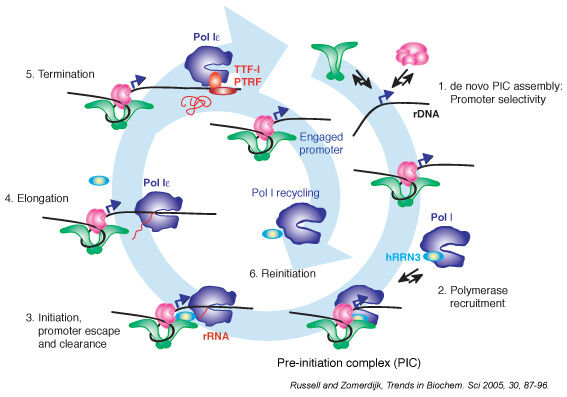Dr Joost ZomerdijkFRSB
Reader
DArcy Thompson Unit, School of Life Sciences
Programme Lead for MSc Biomedical and Molecular Sciences programmes

Contact
Research
Appropriately coordinated expression of genes is essential for normal cell growth, development and differentiation in all organisms. The control of expression of many genes in eukaryotes occurs at the level of transcription. The central objective in our laboratory is to achieve an understanding of the molecular mechanisms involved in transcription of the ribosomal RNA genes, mediated by RNA polymerase I, and the cellular control of this process. rRNA synthesis drives ribosome biogenesis and, therefore, is associated intricately with cell growth and proliferation. Deregulation of this process can lead to cell death, hyperproliferation or hypertrophy and has been linked to specific cancers and heart disease.
Our research is directed towards determination of:
- the role of the essential promoter selective TBP-TAF complex SL1 in coordinating the formation of transcription pre-initiation complexes
- the molecular mechanism of activation by UBF of promoter escape by Pol I
- the dynamics of the Pol I proteome
- the link between cell growth and proliferation and Pol I transcription
- the factors involved in promoting transcription elongation and re-initiation
- the roles of novel growth-regulated and Pol I-associated factors in human cells

The RNA polymerase I (pol I) transcription cycle: pre-initiation complex formation (PIC), transcription initiation, promoter escape and clearance, elongation, termination and re-initiation. (1) De novo PIC formation involves the selective binding of selectivity factor 1 (SL1) to the rDNA promoter, the incorporation of activator upstream binding protein (UBF) and (2) the recruitment of Pol Iβ by SL1. (3) Pol I initiates transcription upon promoter opening and, following promoter escape (3), pol I is converted into a processive enzyme (pol Iε), which elongates the nascent rRNA (4). (5) Transcription by pol I terminates at the 3′end of the gene at specific sequences bound by termination factor TTF-I and transcript-release factor PTRF, with the concomitant release of pol I and the nascent rRNA. (6) SL1 and UBF remain promoter-bound following promoter clearance by pol I, and form a re-initiation scaffold onto which a pol Iβ complex, perhaps generated from recycled pol I and hRRN3, is recruited, and the resultant productive PIC can initiate another cycle of transcription. (Russell and Zomerdijk, Trends in Biochem. Sci 2005, 30. 87-96)
Teaching
- Programme Lead for MSc Biomedical and Molecular Sciences programmes
- Module Manager Taught Postgraduate Programme (MSc) for modules ’Scientific Method and Skills’ (BS51009), 'Project Proposal and Associated Skills’ (BS52008) and ‘MSc Research Project’ (BS53004)
- Module Manager for Undergraduate (UG) Level 4 in 'Advanced Gene Regulation and Expression' (BS42010)
- Module Manager for UG Level 3 in 'Gene Regulation and Expression' (BS31006)
- Academic Lead on UG Level 3 Module 'Molecular Biochemistry' (Practical project) (BS32011)
- Module Manager for UG Level 2 in ‘Laboratory and Research Skills 2C’ (BS22003)
- Oversight and contributor to UG Level 2 course Cellular Communication (BS21002)
- Module Manager for UG Level 1 in ‘Genes and Heredity’ (BS12001)
- Contributor to UG Level 1 in ‘Evolution of Cells’ (BS11002)
Stories
News
Programme leads have been appointed for two new taught postgraduate courses that will commence in the autumn.